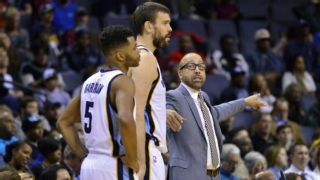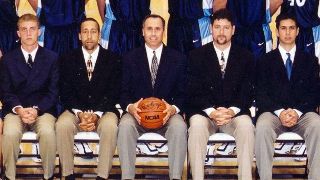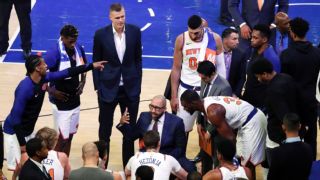|
It's late July, and David Fizdale has just arrived to a small port city on the eastern coast of the Baltic Sea. It's not a vacation, but it might be the most important trip of the summer for the New York Knicks coach. Fizdale and his wife, Natasha Sen-Fizdale, are in Liepaja, Latvia, to meet with the Knicks' face of the franchise, Kristaps Porzingis, and his family. They spend time visiting the court Porzingis built through his foundation and touring the athletic facility at which he spent time rehabbing from last season's ACL surgery. "This trip is more about getting to know him intimately," Fizdale said. "Know his family, know where he's from, kinda get to see what made him 'Kristaps.'" Fizdale was prepared for a detailed conversation about his last job, which included a fraught relationship with another star big man, Memphis Grizzlies center Marc Gasol. "Obviously there was enough stuff from [Memphis] that I felt like I wanted to be open and honest," Fizdale said. "To my pleasant surprise, I got over there and that was a very little part of our discussion, and most of it was about our families, our vision for the team, our vision for him. "And a lot of eating." The trip was considered a success by everyone involved; most importantly by Porzingis. "We got to know each other a little bit," Porzingis said. "And we spent some really, really productive days together." For Porzingis, it was a solid first impression of the fourth head coach of his young NBA career. For Fizdale, it was a crucial step toward building the coach-star relationship that never developed in Memphis and spelled the abrupt end to his 101-game tenure with the Grizzlies. "Sometimes hitting bottom -- as I can attest to -- changes your mentality."
ON THE NIGHT of April 17, 2017, the meme was born. After a loss in Game 2 of the Grizzlies' first-round series against the San Antonio Spurs, Fizdale's memorable rant aimed toward the officials stole the show in the AT&T Center press room. Twitter did the rest. For days, Fizdale's highlight reel was a staple on sports shows across the country and spawned thousands of social media posts. T-shirts with "Take that for data" and "They're not gonna rook us" were a hot commodity in Memphis. Grizzlies players even offered to pay his $30,000 fine: "We told him right away, you're not going to have to pay that," guard Mike Conley said. It seemed Fizdale had built a strong foundation during his first season in Memphis, but it all came apart seven months later. Fizdale was fired by the Grizzlies amid an eight-game losing streak and a public falling-out with Gasol. "We had some moments where I pushed too hard, and I probably should have done more research and spent more time getting to know the person," Fizdale said of Gasol during an interview on "The Michael Kay Show" in May. Fizdale visited with Gasol in Europe before the 2017-18 season, but it failed to strengthen the relationship moving forward. The tension came to a head in late November 2017, when Gasol was benched in the fourth quarter of a loss to the Brooklyn Nets. Gasol expressed his frustration, and Fizdale was fired the next day. "I went in there just force-feeding culture down everyone's throat," Fizdale told NBC New York in August. "I had a small window, I felt, with those guys. So I really tried to fast-track everything. And there's just some things you can't rush. "You can't rush relationships, you can't rush trust, you can't rush the culture." Troy Daniels, who played under Fizdale with Memphis in 2016-17, said he and many other Grizzlies appreciated Fizdale, but the team's dynamic -- the franchise had long established its "Grit 'N Grind" mindset -- made it difficult on the first-time head coach. "There wasn't anything wrong with his plan to build a culture, but it's hard to build on top of a culture that's already there," Daniels said. "Especially when you've got a lot of vets and guys that are proven in the league. It's very hard to do." "It's the NBA. It's a players' league. If one player doesn't like it, two players don't like it, you might have a problem." The firing left Fizdale asking himself, after a highly successful career as a top assistant, whether he was cut out for a lead role on an NBA bench. "When you get fired after a year, you start to doubt and question," Fizdale said. "'Are you good enough for it? Do I belong?'"  Fizdale shifted to a television analyst role with ESPN while he contemplated his future, and whether he wanted to pursue another coaching job after a difficult debut in Memphis. "TV was comfortable for me. Maybe I could have sat up there and did TV for the rest of my life and not had the stress of coaching," he said. The second career didn't last long. The Knicks, after a 29-53 campaign and the immediate firing of Jeff Hornacek, hired Fizdale in May to become the franchise's ninth head coach to start a season since 2001. Despite New York's track record of coaching carousels and perennial lottery trips -- and with a four-year offer on the table from the Phoenix Suns -- the chance to build something in the Big Apple was too enticing. "The risk-reward thing," Fizdale said during his introductory news conference, "I just said 'the hell with it.' "It's the Knicks."
ERIC MUSSELMAN STILL chuckles when he thinks about the conversation. In September 2012, Musselman, who was the Golden State Warriors' coach during Fizdale's first season as an assistant with the Warriors in 2003-04, was fresh off coaching the Venezuelan national team when he looked down at his phone to see a text. It was Fizdale. Hey, can you call me? I have a question about something. Fizdale, then an assistant with the Miami Heat, was a few months removed from winning his first NBA title: a five-game series win over the Oklahoma City Thunder starring LeBron James, Dwyane Wade and Chris Bosh. With the 2012-13 NBA season just weeks away and a championship to defend, there was Fizdale, checking in on the offensive sets of a Venezuelan team that had just finished ninth out of 12 in the FIBA Olympic qualifying tournament. "Are you kidding me?" Musselman said. "He's seriously watching our Venezuelan national team! He's probably the only guy in the [U.S.] ... He only had a month to kind of have down time, and he's watching us!" That zeal helped Fizdale separate himself from the pack as a young assistant. At each stop, Fizdale established a strong rapport with star players and role players alike -- a valuable commodity in a league where players' opinions can be the difference between a pink slip and a contract extension for the head coach. "Putting out fires, anticipating things," Musselman said of Fizdale's attributes as a coach. "And I think that's just having a player antenna where you just kind of know, 'Hey I've got to get to this [potential issue] before it escalates.'" In some ways, Fizdale's status as a player whisperer began in the living room of a rented home in the Point Loma neighborhood of San Diego, sitting on his favorite chair -- a beat-up pink recliner he affectionately named Papa San. ("We haven't talked about Papa San in years," Fizdale said. "I miss that chair.") "We'd be talking about the day, and it was almost always centered around players, player relationships and player improvement," said Sam Scholl, current University of San Diego head coach and Fizdale's roommate while the two were on the coaching staff together at USD. "[Normally] coaches are going home and watching film until their eyes bleed," Scholl said, but conversations with Fizdale normally ventured past mere X's and O's. "Every coach obviously understands that [player relationships are] part of improvement, but not a lot of them really want to invest in it," Scholl said. "You've got to get out from behind the desk ... you've got to spend time with them in their world. He invests time. He understands the value in that." 
IN LATE MAY, and with the Cleveland Cavaliers battling the Boston Celtics in a tight East finals, chatter inside the Knicks' practice facility was centered around whether Jayson Tatum, Jaylen Brown & Co. could end James' run to an eighth straight NBA Finals. Amid the conversation, Fizdale -- introduced as head coach just three weeks prior -- chimed in. "[Fizdale said], 'If you guys want to go to the game, just let me know,'" Knicks guard Emmanuel Mudiay recalled. A few days later, Mudiay, guards Frank Ntilikina and Damyean Dotson and their new coach were off on a field trip, hopping in a van for the 200-mile trek to Boston's TD Garden for Game 5. "I couldn't remember the last time I went to an NBA game and I wasn't playing in it," Dotson said. The quartet walked through the same arena entrance as most fans, finding their seats in the lower bowl opposite the Cavs' and Celtics' benches in time to catch the end of warm-ups. (One fan wished Fizdale good luck, while another told Dotson, who was wearing team gear, "Hey, the Knicks suck!") Throughout the game, Fizdale pointed out some of the adjustments made over the course of the series and examined the chess match between James and the Celtics. "We talked the whole way there, talked at dinner," Dotson said. "It was really the start of this whole thing -- building the culture. "[Fizdale] said, 'We'll get here soon, get a feel for this.'" The trip underscored just where the Knicks are as a franchise: casual observers in the games that matter most. New York has one playoff series win in the past 18 years and owns the NBA's second-lowest winning percentage since the turn of the century. Now it's Fizdale's task to get the Knicks back to playing in the postseason -- not just watching from the stands. "To be a part of a rebuild that gets this place back to long-term winning, I couldn't pass that up," Fizdale said shortly after accepting the job. "I just felt like I don't want to look back on my life and say I didn't take this chance. I don't know how it's going to turn out. I just know that I want to get to work."  In the months before he accepted the Knicks job, Fizdale sought advice from coaches, current and former players ("especially star players," Fizdale said), current and former NBA executives, non-sports executives and civil rights leaders -- although Fizdale wouldn't reveal his famous sources. The topic of conversation? "How they manage their talent," Fizdale said. "How to hold them accountable but at the same time give them room for their creative space ... without it becoming combative or threatening." Case in point: Ntilikina, a 20-year-old guard who, according to Fizdale, had been suffering from a glaring lack of confidence. "He said, 'I just want you to be you, I want you to be aggressive,'" said Ntilikina, who has responded by hitting 41.4 percent of his 3-pointers this season. "[Fizdale won't] be screaming at you if you make a mistake. Just go through the mistakes." For Fizdale, it's his mistakes that ultimately led him to New York, to Latvia and to a chance at re-establishing his coaching career after a short, forgettable stint in Memphis. "I'm really tough on myself. I self-reflect," Fizdale said during his introductory news conference. "It's not always easy to look in that mirror and say you were part of the problem. ... "I feel like it'll be a lot smoother [in New York], being able to collaborate with these guys. Lay down a culture, rebuild this."
|

